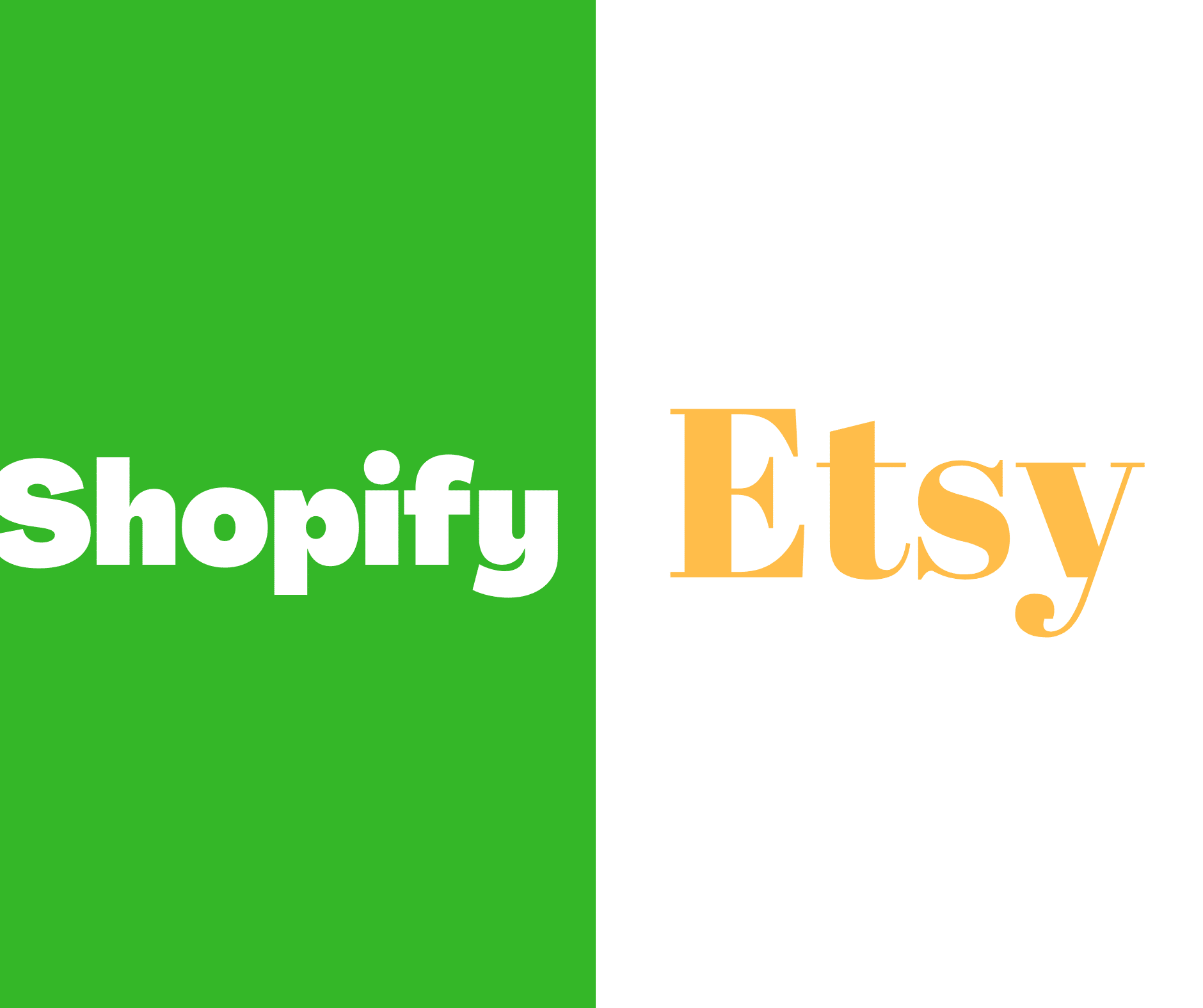
Shopify Vs Etsy is a common comparison some merchants make when it comes to choosing where to sell online. Both are robust platforms every merchant will like to go for considering the fact that they are where consumers spend their money.
But identifying the most suitable according to your needs can be demanding. The goal of this ultimate guide is to keep you informed so as to choose the best from the two as you plan to begin to sell online. We’ll compare Shopify and Etsy base on the following:
- Overview
- Key features
- Uptime and Availability
- Payment methods and fees
- Ecommerce tools
- Customer Support
- Pricing
- Pros and Cons
- Customer Attraction
Shopify Vs Etsy: Overview
Shopify is a robust e-commerce platform where you can build your online store. It is designed to help you start, run, and grow your business. It powers over 1,000,000 business worldwide. Shopify has amazing features that make it easy for you to run your e-commerce business successfully.
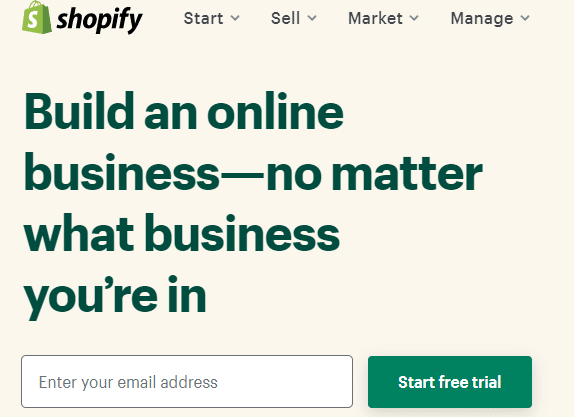
It has over 70 professionally designed themes which makes it easy for you to customize your website. As a web website builder, you can host your website on this platform. A full-featured content management system is attached to your online store.
Etsy is an online marketplace where you can list your products for sale. It is a platform that helps you as a seller to market your goods and also help buyers to locate them. It has powerful tools and features that help you scale your business while allowing you to become a seller on the platform with just $0.20.
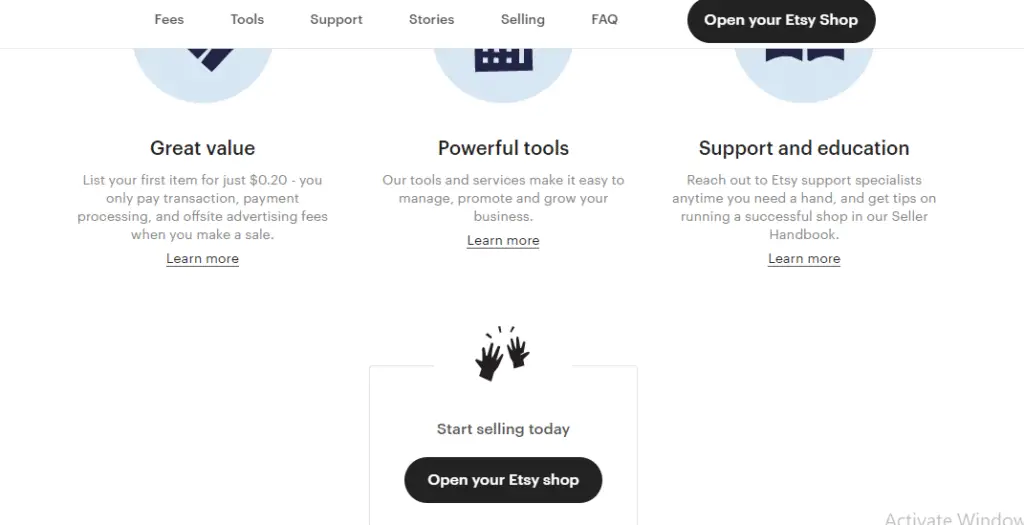
According to Statista, Etsy has over 2.1 million active sellers and 39.4 million active buyers on the platform globally.
Shopify Vs Etsy: Key Features
The features of Shopify and Etsy are worth discussing. It is with them that you are empowered to carry out a lot of activities while you sell your products.
Shopify Features
- Shopify has a shopping cart that is built into your online store. This makes it easy for your customers to shop in your store while on the go.
- Shopify supports SEO practices which are to ensure that your potential customers find your store easily on search engines.
- Compatible with Google Analytics which makes it easy for you to monitor the behavior of your customers in your store. You can track visits and sales.
- Access to CSS and HTML which makes it easy to customize any aspect of your online store.
- It integrates with apps like Inventory Source, Ordoro, ecomHub, making it suitable for a dropshipping business.
Etsy Features
- It has an internal analytics tool that empowers you as a seller to track orders, revenue, and see people that viewed your products.
- It is SEO friendly. The products you listed can be seen by customers when they search on the platform.
- Feedback mechanism to help you identify products that customers are buying more for you to create and list similar to them.
- Easy Logistics makes it easy to ship products to your customers seamlessly. Depending on the weight and dimension of the product, Etsy will help to customize the cost of shipping for every buyer. Your customers can also decide the shipping method they want after they make a purchase.
- Just like Shopify, Etsy integrates with a lot of apps that allow you to scale your business as a merchant. Some of them are Marmalead, Craft Task Manager, Spreesy, ViralWoot, OrangeTwig, Printful. Others are Vegal, Craftybase, Craft Maker Pro, Billbee, Tax Jar.
Shopify Vs Etsy: Uptime and Availability
Nothing is embarrassing as having a slow online store. An online store that doesn’t load at the expected speed is a disaster. Imagine a customer wants to check out a product on your store only to discover that your store takes forever to load.
Or he is about to make payment for a purchase only to experience downtime. These can cause your customers and the sales you should have made. That’s why we need to check the uptime and availability of Shopify and Etsy.
Shopify Uptime and Availability
Shopify claims it has 99.99% server uptime which makes it easy for your online store to be available to your customers 24/7. It services are available in all region around the globe. However, it sometimes experiences downtime due to third-party apps, errors from public and private apps, and errors during theme customization.
Etsy Uptime and Availability
Etsy claims that it has 99.9% uptime. This means that you won’t experience downtime selling in this marketplace. To assure you as a seller that you won’t experience downtime on your store, Etsy has a page for you to check for Etsy’s uptime at any point in time.
No Winner: Its A Tie
Both platforms claim to have a good server uptime. Shopify claims to have 99.9% and Etsy 99.9%.
Shopify Vs Etsy: Payment Method And Transaction Fees
While you list your products on Shopify and Etsy, it is important to think of how to receive payments when customers pay for orders. Also, the transaction fees you’re likely to pay for processing your payment is what you should know.
The transaction fee of some e-commerce platforms may be hidden and shock you if don’t know before you begin to sell on them. But relax Shopify and Etsy don’t have any hidden transaction fees. But it is always good to know before you sign up with them.
Shopify Payment Method And Transaction Fees
Shopify owns Shopify payment which does not charge transaction fees for store owners who adopted it as a payment method. But it is supported in a few countries. You can use other payment methods if unfortunately it’s not supported in your country.
Stripe, 2Checkout, Paypal, First Data, and Amazon payments are third party payment methods you can use as store owner on Shopify. It charges different transaction fees depending on the plan you’re when. For Basic Shopify, it is 2%. Shopify and Advanced Shopify are 1% and 0.5% respectively.
Etsy Payment Method And Transaction Fees
Etsy doesn’t charge a monthly subscription fee but you have to pay a token of $ 0.20 for listing a product on its marketplace. This amount is to publish the products you’ve listed and it lasts for 4 months. When you make a sell a transaction fee of 5% is deducted. 3% and $0.25 are charged for processing your payment.

If you’re confused let me explain better. Processing fees are the amount payment gateway charge for the services they offer you – helping you receive payment. This might break your pocket if you’re a beginner on this platform. Once you begin to rake in much money through sales, you won’t feel it.
Winner: Shopify
When it comes to transaction fees, Shopify’s rate is lower than Etsy’s. If you use Shopify payment which they own, you pay nothing as a transaction fee.
Shopify Vs Etsy: E-commerce Features
As lucrative as e-commerce is, it is becoming a competitive way of making money online. Hence you need a platform that has features that will help you scale your easily. Both Shopify and Etsy have good features but we have to check them out.
Shopify E-commerce Features
Shopify has 70+ professional themes that you can use to give your online store an awesome outlook. No matter the niche you plan to go into, Shopify themes got you covered. Just head to the theme store to select any you want. If you’re good at coding, you can play around with HTML and CSS to customize your store to your text.
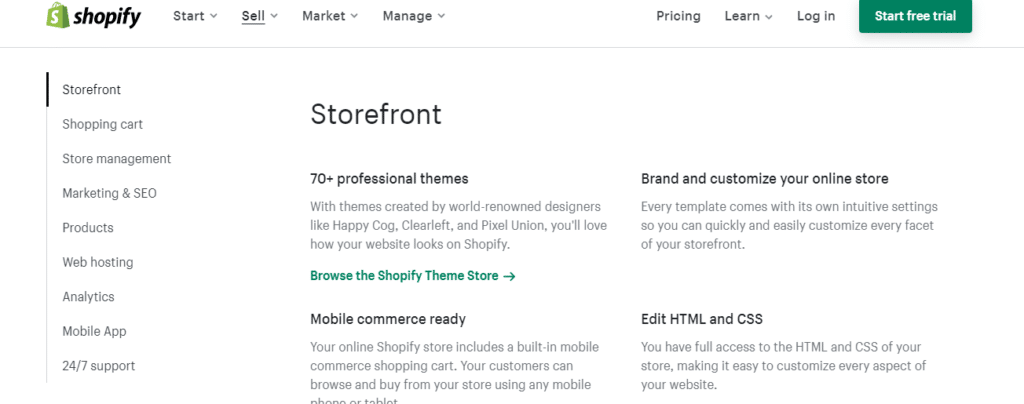
If you’re not you can hire a freelancer on Fiverr to help you do that. Shopify offers you a shopping cart that gives your customers the best experience when they want to make a purchase. With the abandoned recovery checkout, you remind your customers that they are yet to complete the order they placed.
It supports SEO practices to help customers find your store on the search engine. As a store owner on Shopify, you enjoy unlimited bandwidth – you don’t have to pay per traffic on your store.
The security of your customer’s credit cards is guaranteed as Shopify is Level 1 PCI – compliant. With the increase in the usage of smartphones, Shopify has a mobile app that makes it easy for you to manage your store from your mobile phone. Also your customers and browse and make a purchase on your store while on the go.
Other E-commerce features of Shopify are:
- 100+ payment gateways.
- Flexible shipping.
- 50+ languages to create your store with
- Free SSL certificate.
- You can connect your online store to Facebook for your fans to make a purchase without leaving Facebook.
- Use Google Analytics to track every activity in your store. You can even export reports to other spreadsheet tools for further analysis.
Etsy E-commerce Features
Etsy has primary features with which you can manage your store. With the Etsy account, you can purchase and print discounted postage thereby saving yourself the shipping cost and hastening the entire process. You also have the Etsy App to run your store while on the go. To increase your customer base, and get found online easily, Etsy has marketing and advertising tools that help you with that.

You can also use them to draw customers to your shop through different social media platforms. But Etsy somehow limits your scalability as a merchant because you can only sell handmade, craft, and vintage products. Etsy might not be the best platform for you if you plan to sell goods outside these areas.
Since Etsy is just a marketplace, rather than an e-commerce platform, the list of goods you have isn’t added to your store account. You have to keep the record yourself. The Etsy plus is there for you to upgrade to if you want advanced tools for your store. You enjoy to the following with Etsy Plus:
- Credit for advertisement
- Alert your customers when you restock a particular good.
- Customization option
- Be informed of deals on your own web address
Winner: Shopify
Shopify is a robust E-commerce platform that has all you need to scale your business as a merchant. It has a lot of advanced tools which you have to pay to use. But if you want to sell on a small scale then Etsy is for you.
Shopify Vs Etsy: Customer Support
No matter how good you’re at selling online, you will need the assistance of the customer team of these platforms. It is even more important if you’re a newbie. You are likely to get stuck with one thing or another. It has customer support to run to. Let’s see how Shopify and Etsy offer their help to you in times of trouble.
Shopify Customer Support
Shopify has a dedicated support team that is available to support you 24/7. You can choose to contact them through email, live chat, or phone. It has a community you can join and get the perspective of other store owners on marketing, accounting, etc. You also have access to webinars, video series, and ebooks that will help you with selling online.
Etsy Customer Support
Etsy just has a help center where you see and read a lot of articles that will help you fix an issue. You can join its community discussion, ask questions on things that bother you, and get opinion answers. You send an email to its support team or schedule a phone call if necessary.
Winner: Shopify
Its customer support is more comprehensive than that of Etsy. If you run into trouble around 1will need to send a mail or schedule a call to get help with Etsy. But Shopify offers you 24/7 detailed support.
Shopify Vs Etsy: Pricing
Having reached this far, it is important we discuss the pricing plans of Shopify and Etsy. This is to prepare your mind on the amount you need to pay either monthly or yearly to be on these platforms.
Shopify Pricing
Shopify has 3 pricing plans which are as follows:
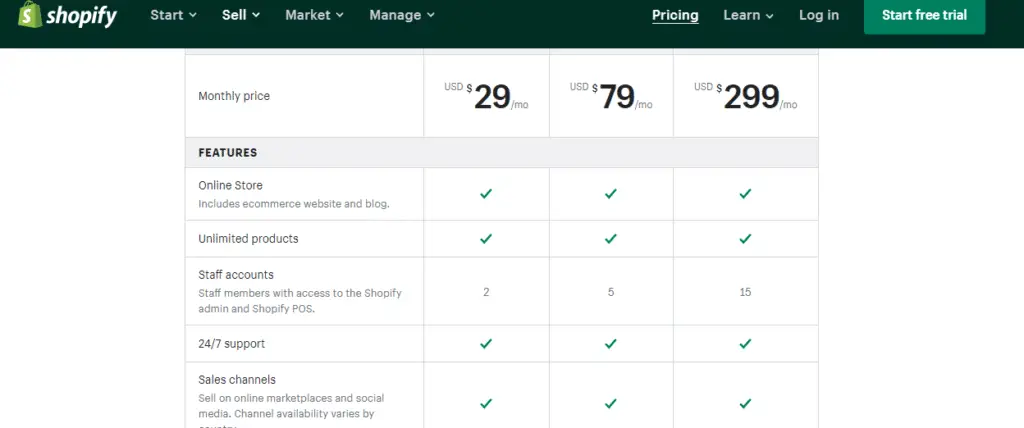
- Basic Shopify – $29 per month
- Shopify – $79 per month
- Advanced Shopify – $299 per month.
Note that these pricing plans come with different features.
Etsy Pricing
Etsy has the standard plan which is the basic level and doesn’t charge a monthly fee. You only pay the listing fees, transaction, and processing fee if you make a sale. It has a plus plan which you can upgrade to and enjoy advanced features at $10 per month.
No Winner: It’s A Tie
Shopify offers awesome value for the money you pay while Etsy is less expensive. For individual sellers, Etsy pays off while for merchants that want to scale their business, Shopify will be best suited. But it all depends on your requirements and budget.
Shopify Vs Etsy: Customer Attraction
Whether you sell on your online store or marketplace, you need customers to patronize your products for you to make sales. Your store deserves to be seen by customers after you have uploaded product photos and written descriptions. Etsy does better in this aspect. With over 33 million buyers, customers simply search for your product on Etsy without looking for you specifically.
But a setback here is that it is not guaranteed those customers will buy your product because of high competition. Over 50 million products compete for the attention of over 33 million buyers in this marketplace. On the other hand, Shopify optimizes your store to appear on search engines.
But the only way to locate your products is through your store name. Shopify gives you more control over your store to connect customers as you like. But you have to get your SEO right to win customers.
Winner: Etsy
With Etsy, you just have to hope that customers purchase your products from the millions out there. While you’ve control over your store and customers on Shopify, you have to get your SEO strategy right to win customers.
That’s it with the comparison of Shopify and Etsy. But before you make your final decision, take into account all the points made here. Weigh them against your requirements as you plan to begin to sell online.
To ensure that you make the best decision, I have collated some relevant points you may like to consider before making your final decision. That’s the pros and cons of Shopify and Etsy
Shopify Pros
- Offers you a 14-day free trial
- 99.9% uptime server
- Comprehensive customer support
- Awesome themes to design your online store
- Design your store in 50 different languages
- Robust payment method
- Unlimited bandwidth
- Integrates with your favorite apps to scale your business
- Advanced e-commerce tools
- Sell any kind of product you want
Shopify Cons
- Pricing plans are relatively costly
- Advanced tools you need are not free. They add to your monthly fee.
Etsy Pros
- It is easy to attract customers on its marketplace
- Easy to set up and run
- 99.9% uptime
- Suitable for small scale merchants
- You don’t pay to sell on Etsy if you are on the standard plan
Etsy Cons
- You can only sell hand made goods, craft, and vintage products.
- Lacks some of the major tools you need to sell online.
- You’re charged $0.20 for each product you list on the marketplace. You also pay a 3% +$0.25 processing fee when you make a sale.
Wrapping It Up
I trust that you’re now informed on the best choice to make between Shopify and Etsy. Both platforms are where you can sell your products. But the final decision to go for any depends on your requirements. If I am to choose, Shopify is suitable if you plan to run a full-fledged e-commerce business.
It has all the advanced tools you need to scale your business. Also, you’re can sell any kind of product. Etsy is just a marketplace with basic marketing tools. If you intend to run a small-scale store, then Etsy is what you need. Anyways the choice is yours to make base on your budget and need.
Recommend reading: Check out my beginner’s guide to how Shopify works. Also, feel free to read my detailed comparison of Wix and Shopify.
